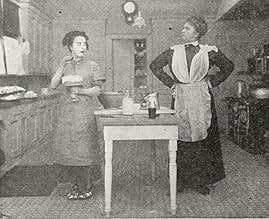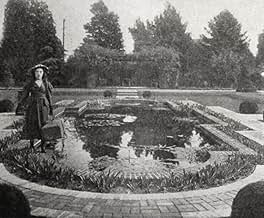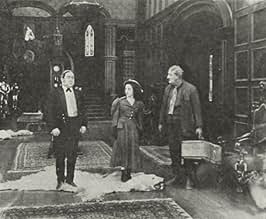IMDb RATING
6.1/10
1.2K
YOUR RATING
Mickey, an orphan who has been brought up in a mining settlement, is sent to New York to live with her aunt.Mickey, an orphan who has been brought up in a mining settlement, is sent to New York to live with her aunt.Mickey, an orphan who has been brought up in a mining settlement, is sent to New York to live with her aunt.
- Directors
- Writers
- Stars
George Nichols
- Joe Meadows
- (as George O. Nicholls)
Lew Cody
- Reggie Drake
- (as Lewis J. Cody)
Minta Durfee
- Elsie Drake
- (as Minta Durffy)
Minnie Devereaux
- Minnie
- (as Minnie Ha Ha)
Joe Bordeaux
- Stage Driver
- (uncredited)
William Colvin
- Butler
- (uncredited)
Edgar Kennedy
- Stage Driver
- (uncredited)
- …
Clarence Lyndon
- Grocer
- (uncredited)
Eva Thatcher
- Cook
- (uncredited)
- Directors
- Writers
- All cast & crew
- Production, box office & more at IMDbPro
Featured reviews
Mack Sennett and star Mabel Normand co-produced this 1918 silent comedy/melodrama which, surely, satisfied the era's moviegoers. Normand, a natural comedienne, plays "Mickey," an orphan raised by a rough and grizzled down-on-his-luck miner abetted by a corpulent, exasperated but loving woman-of-all-chores.
Back East, New York to be exact, Mickey's aunt, as impecunious as she is extravagant, skirts with ruin as she hopes her daughter will win the affections of The Decent Man. Scheming mom and grasping daughter hope an engagement will bring them real solvency.
Not too hard to guess what happens. As the piano music goes on - and on and on and on - the hero goes West to handle a mine boundary issue. He meets the sparkling Mickey and her menagerie before she leaves for the East with her miner guardian. But the seeds of love have been planted.
Mickey's been cordially invited to live with auntie under that harridan's very mistaken and soon to be blown belief that the young girl is the key to a rich mine's bounty. Finding that to be very wrong, Mickey is ordered into domestic service by nasty auntie. Yep, Cinderella story, sort of. And we all know - as did the Great War audiences - how such stories MUST end. A happy Mickey and her guy.
Sennett was a master at comedies that entertained without surprising. No dazzling or innovative cinematography here, just a guaranteed good hour and a half at the theater (or, now, in front of a TV).
Normand strayed off the reservation of both respectability and sobriety not that many years after "Mickey" when she was at the height of popular acclaim with a Goldwyn contract. Stars didn't have the bounce-back capability many seem to enjoy today and her close association with two lurid murders, neither of which she was implicated in, hastened a downward spiral already in freefall.
She died fairly young of tuberculosis, her career practically ended. But she remains alive in films that show the depth of comedic ability of a talented actress who could make audiences laugh without their ever hearing her utter a syllable. "Mickey" is one of her best efforts.
In 1970, Bernadette Peters, who just opened in a well-received Broadway revival of "Gypsy," played Mabel in "Maude and Mack," a musical about the director/star duo. The play didn't do well on the Great White Way but it's become something of a staple for amateur theatrical groups. Normand would have appreciated that.
Well worth renting or buying.
8/10.
Back East, New York to be exact, Mickey's aunt, as impecunious as she is extravagant, skirts with ruin as she hopes her daughter will win the affections of The Decent Man. Scheming mom and grasping daughter hope an engagement will bring them real solvency.
Not too hard to guess what happens. As the piano music goes on - and on and on and on - the hero goes West to handle a mine boundary issue. He meets the sparkling Mickey and her menagerie before she leaves for the East with her miner guardian. But the seeds of love have been planted.
Mickey's been cordially invited to live with auntie under that harridan's very mistaken and soon to be blown belief that the young girl is the key to a rich mine's bounty. Finding that to be very wrong, Mickey is ordered into domestic service by nasty auntie. Yep, Cinderella story, sort of. And we all know - as did the Great War audiences - how such stories MUST end. A happy Mickey and her guy.
Sennett was a master at comedies that entertained without surprising. No dazzling or innovative cinematography here, just a guaranteed good hour and a half at the theater (or, now, in front of a TV).
Normand strayed off the reservation of both respectability and sobriety not that many years after "Mickey" when she was at the height of popular acclaim with a Goldwyn contract. Stars didn't have the bounce-back capability many seem to enjoy today and her close association with two lurid murders, neither of which she was implicated in, hastened a downward spiral already in freefall.
She died fairly young of tuberculosis, her career practically ended. But she remains alive in films that show the depth of comedic ability of a talented actress who could make audiences laugh without their ever hearing her utter a syllable. "Mickey" is one of her best efforts.
In 1970, Bernadette Peters, who just opened in a well-received Broadway revival of "Gypsy," played Mabel in "Maude and Mack," a musical about the director/star duo. The play didn't do well on the Great White Way but it's become something of a staple for amateur theatrical groups. Normand would have appreciated that.
Well worth renting or buying.
8/10.
The adventures of a gold miner's daughter, Mickey stars Mabel Normand, who was one of the biggest film stars of the teens and 20s. In a series of episodes that are loosely connected, Normand plays a Cinderella-like character who goes to live with a relative (Laura La Varnie) but when it's discovered the gold mine is a bust, she is made a maid in the household. But she catches the eye of the old lady's daughter (Minta Durfee) and is eventually sent back to the country just as the mine strikes it big. The suitor (Wheeler Oakman) follows her. The plot seems to stray here and there without much narrative thread. At one point, a lecher (Lewis Cody) is chasing Mabel around a mansion, and then we're off to the horse races. But while the episodes are tacked together, Mabel Normand holds the viewer's attention throughout the 90 minutes.
This film was co-produced by Normand and Mack Sennett. George Nichols, Minnie Devereaux, Tom Kennedy, and Edgar Kennedy co-star. And yes Minta Durfee was famous for being the wife of Roscoe "Fatty" Arbuckle, a famous co-star with Normand in many short films. And the music by Neil Moret (who died in 1943) is absolutely great. I hummed the songs for days and learned to play them on the piano.
This film was co-produced by Normand and Mack Sennett. George Nichols, Minnie Devereaux, Tom Kennedy, and Edgar Kennedy co-star. And yes Minta Durfee was famous for being the wife of Roscoe "Fatty" Arbuckle, a famous co-star with Normand in many short films. And the music by Neil Moret (who died in 1943) is absolutely great. I hummed the songs for days and learned to play them on the piano.
Mable Normand is forever remembered for her comedies for Mack Sennett. These two-reel films were fun but also quite short and were done strictly for laughs. "Mickey" was a major change for Ms. Normand, as now she was making a full-length film and one which was more of a melodrama. In fact, it's very much a style film that Mary Pickford made famous from the late 1910s through the 1920s--playing a very young lady who, by the end of the film, has found love and happiness.
Mickey is a young tom-boy (Normand) who lives with her father's old mining partner. It seems her father died and this man has cared for her for many years. However, as she gets older, he realizes he's not much good teaching her how to become a lady and he sends her off to live with her aunt. As for the aunt, she only wants Mickey because she learns she owns a mine. When she discovers the mine isn't productive, she makes Mickey a servant in the home--much like Cinderella. But, just after the aunt gets rid of Mickey, she learns the mine has finally paid off and Mickey is rich--and suddenly she DOES want Mickey to live with her! Well, in the meantime, there is a man who has fallen for Mickey--and he cannot find her in order to propose. But the aunt decides to sic her no-good son on her and he proposes to Mickey. Can the old boyfriend find her before it's too late?!
While this film is a VERY predictable old fashioned melodrama (aside from the bizarre horse race sequence near the end--I did NOT see that coming), it's a NICE predictable old fashioned melodrama! Sure, you can figure out what's going to happen long before it does, but the film is so well made and enjoyable you don't really mind. Sweet and quite charming. It's sure a shame that Mable's career and life were cut so short--I would have loved to see more films like this one.
By the way, I think parts of the end of this film must have been missing. That's because there are very few intertitle cards early in the film. Yet, near the end, there are several with extensive exposition--like it's filling in for gaps in the film.
Mickey is a young tom-boy (Normand) who lives with her father's old mining partner. It seems her father died and this man has cared for her for many years. However, as she gets older, he realizes he's not much good teaching her how to become a lady and he sends her off to live with her aunt. As for the aunt, she only wants Mickey because she learns she owns a mine. When she discovers the mine isn't productive, she makes Mickey a servant in the home--much like Cinderella. But, just after the aunt gets rid of Mickey, she learns the mine has finally paid off and Mickey is rich--and suddenly she DOES want Mickey to live with her! Well, in the meantime, there is a man who has fallen for Mickey--and he cannot find her in order to propose. But the aunt decides to sic her no-good son on her and he proposes to Mickey. Can the old boyfriend find her before it's too late?!
While this film is a VERY predictable old fashioned melodrama (aside from the bizarre horse race sequence near the end--I did NOT see that coming), it's a NICE predictable old fashioned melodrama! Sure, you can figure out what's going to happen long before it does, but the film is so well made and enjoyable you don't really mind. Sweet and quite charming. It's sure a shame that Mable's career and life were cut so short--I would have loved to see more films like this one.
By the way, I think parts of the end of this film must have been missing. That's because there are very few intertitle cards early in the film. Yet, near the end, there are several with extensive exposition--like it's filling in for gaps in the film.
'Mickey', as all Mabel Normand films, has her at the centre of attention from the beginning till the end. The camera, the action, the entire plot, are all attracted to her like magnets. And Normand is excellent in this film, establishing her status as silent era's first lady of comedy.
And we do have a great comedy. Full of suspense, 'Mickey' is never tiring, never boring. We are to witness the adventures of a mine-owner young girl, who cares for mining as much as donkeys care for belts being pushed down their throats. She is a mischievous child who, even when she is brought in the rich household of her aunt in the East, never tires to be a child. Yet it is remarkable what love can do.
The supporting cast is all first rate, with Wheeler Oakman, George Nichols, Minnie Devereaux or Laura La Varnie, all delivering some great comedic performances that seem to be untouched by the axe of time. But they are all there for Normand, who does everything from jumping nude into the water to riding horses and some impressive high altitude stunts. She was one of a kind, and 'Mickey' is there to prove it.
And we do have a great comedy. Full of suspense, 'Mickey' is never tiring, never boring. We are to witness the adventures of a mine-owner young girl, who cares for mining as much as donkeys care for belts being pushed down their throats. She is a mischievous child who, even when she is brought in the rich household of her aunt in the East, never tires to be a child. Yet it is remarkable what love can do.
The supporting cast is all first rate, with Wheeler Oakman, George Nichols, Minnie Devereaux or Laura La Varnie, all delivering some great comedic performances that seem to be untouched by the axe of time. But they are all there for Normand, who does everything from jumping nude into the water to riding horses and some impressive high altitude stunts. She was one of a kind, and 'Mickey' is there to prove it.
Dogs love her, cats love her, jackasses love her and squirrels love to run up her pants legs. Well, who can blame them, right after a scene where she is shown diving nude.... with a suitably long lens of course. Darn it.
There is nothing terribly novel about this Cinderella story of a movie, but it is all carried off with a great deal of charm. Mabel even gets to cut a few capers, instead of simply looking charming while the comedians around her make a mess of things. She's not a great physical comedian, but she is a fine actress and under the direction of comedy *wunderkind* Richard Jones, she gives a fine performance, as does just about everyone in this movie.
There is nothing terribly novel about this Cinderella story of a movie, but it is all carried off with a great deal of charm. Mabel even gets to cut a few capers, instead of simply looking charming while the comedians around her make a mess of things. She's not a great physical comedian, but she is a fine actress and under the direction of comedy *wunderkind* Richard Jones, she gives a fine performance, as does just about everyone in this movie.
Did you know
- TriviaThe highest grossing film of 1918, with a worldwide gross of $8 million on a budget of $250,000.
- GoofsPalm trees and industrial bridges at the railroad station at Great Neck, Long Island, New York.
- Quotes
Herbert Thornhill: She's wonderful, Tom! I never expected to see her again - and now I've proposed to Elsie Drake. I'm in the devil of a mess!
Tom Rawlings: Cheer up old man, you haven't actually been sentenced yet!
- Alternate versionsThe April 17, 1920 issue of Ciné Pour Tous claims the version released in France was shortened.
Details
Box office
- Budget
- $125,000 (estimated)
- Runtime
- 1h 33m(93 min)
- Color
- Sound mix
- Aspect ratio
- 1.33 : 1
Contribute to this page
Suggest an edit or add missing content






























